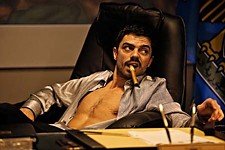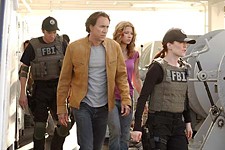Once Were Warriors
1995, R, 103 min. Directed by Lee Tamahori. Starring Rena Owen, temuera Morrison, Mamaengaroa Kerr-Bell.
REVIEWED By Marjorie Baumgarten, Fri., May 5, 1995
Harrowing is the first word that comes to mind when describing this movie. You can tell from the opening shot that Once Were Warriors will not settle for surface illusions. It opens with a tightly focused shot that captures a frolicsome, beachfront, sun-and-surf tourist image of New Zealand, but then gradually pulls back to reveal this lovely sight as nothing more than a billboard fantasy overlooking a drab, dingy, low-rent, ghetto area rammed smack up alongside a noisy highway. This is the New Zealand that is the object of Once Were Warriors' focus. The film's story is both culturally specific and broadly universal and that duality is a large part of what makes Once Were Warriors work. Set in the poor, urban, public housing district of an unspecified New Zealand city, the movie focuses on the life of one dysfunctional Maori family. Poverty, alcoholism, and wife-beating are ripping these family members apart. Schisms also define the characters' various relationships with their Maori heritage; some reject the connection outright and others try to reconcile their native heritage with an urban lifestyle. As the abused wife Beth, Rena Owen creates a spectacular presence. She loves her family and works toward their improvement, and though, at times, her husband Jake (Morrison) abuses her violently, she still loves him deeply and understands (and makes us understand) the muddy wellspring that fuels his displaced anger. The kids all react in different ways. The oldest (Arahanga) joins a Maori gang and leaves home. The oldest girl, Grace (Kerr-Bell), writes beautiful stories and takes care of the younger children and embodies her mother's hope for the future. The middle son Boogie (Emile) is sent away by the state to reform school as the result of a series of petty crimes. The two youngest children vacillate between delight and fear as their parents veer between making love and making war. For the international audience, the exoticism of the Maori culture -- with its elaborate body tattoos and fanciful history -- will offer a certain lure. In New Zealand, Once Were Warriors broke all previous attendance records for both home-grown and international movies of all kinds. Yet there is a certain mentality captured by the film that translates well into most cultures, I suspect. It involves the cycles of dependency, alcoholism, abuse, poverty, and cultural marginalization. The film's searing performances are matched by the lovely camerawork of cinematographer Stuart Dryburgh (The Piano, An Angel at My Table). Some have criticized the film's “upbeat” ending as “unrealistic” and a rare occurrence in real life. My response is that one of the jobs of fiction is to illustrate possibilities and alternate realities. Caveat emptor: The scenes of wife abuse are extremely graphic; also a child is raped in one scene. These images are disturbing, and quite intentionally so, but they are also necessary to the story. If seeing such scenes will disturb you more than seeing a great movie will invigorate you, make the wise choice.
A note to readers: Bold and uncensored, The Austin Chronicle has been Austin’s independent news source for over 40 years, expressing the community’s political and environmental concerns and supporting its active cultural scene. Now more than ever, we need your support to continue supplying Austin with independent, free press. If real news is important to you, please consider making a donation of $5, $10 or whatever you can afford, to help keep our journalism on stands.
Marjorie Baumgarten, Aug. 12, 2011
Marrit Ingman, May 4, 2007
Once Were Warriors, Lee Tamahori, Rena Owen, temuera Morrison, Mamaengaroa Kerr-Bell









